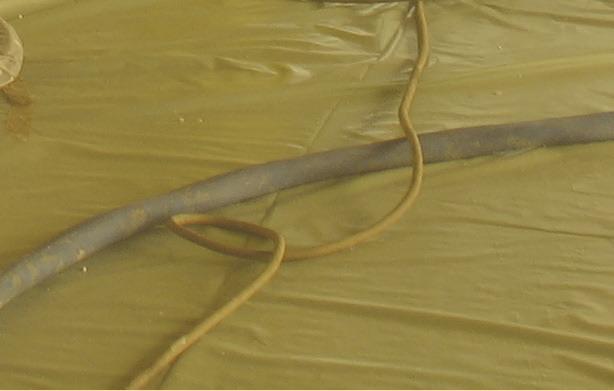
3 minute read
ABBILASH JOSE
TECNOPOL REGIONAL HEAD FOR INDIA, MIDDLE EAST AND AFRICA (SOUTH & EAST)
1. Do you think that the construction sector is very familiar with the applications of products such as polyurea?
Advertisement
It depends on the countries or regions we deal with . When the middle east market is taken to consideration the answer is of course yes .construciton sector is very familiar with polyurea . But when we take the case of asian or african markets still we need to put more efforts to get the polyurea applications in the construction sector.
2. Buildings have to be more coefficient due to climate change, is this factor taken into account in new projects?
Yes of cource . Currenlty we are facing a big challenge with the global warming and it has beed an inconsistency in the weather conditions has been observed over past few years. Say for expample when it is summer it goes on the extreme so as the case in winter. Hence in this case it is very important to add the prodcuts which can control these factors like our thermal insulatons using foam, polyureas and UV reflective polyurethane coatings.
3. Regulations and certifications change from country to country, is this an obstacle or an advantage?
In my opinion it is an advantage if your company is focusing more on certifications oriented jobs since tecnopol has most of the certifications which can be used globally and as our products are universal it seems easier to get the approvals. nevertheless there are certain cases where we face some issues and extra lags due to the regulations and demands of other certifications of those specific countries . say for example in india we are still waiting some certifications to introduce our systems in the bridge decks protective and waterproofing even we have eurpoean and british approvals with the experience of job done in spain and namibia .
4. What is the current state of the Indian construction industry?
The construction industry in India is currently in a period of robust growth. The government is investing heavily in infrastructure development and housing, which is driving demand for construction services. Additionally, the growing economy is leading to increased demand for commercial and residential buildings.
With over 15 years of experience in the construction and waterproofing industry, ABBILASH JOSE joined TECNOPOL in 2015 with the goal of selling polyurea and polyurethane worldwide.
Abbilash is currently head of sales for the India, Middle East and East and Southern Africa regions. In addition to leading the sales activities in these regions, he is personally responsible for monitoring and providing technical advice on the works and projects for which he is in charge. This proximity to the customer and constant on-site advice is part of his success in the region, the key to his constant growth in results.
To date, he has exceeded expectations in the region by delivering various waterproofing projects to TECNOPOL and continues to see growth in numbers.
5. What are some of the major drivers of the Indian construction industry?
Some of the major drivers of the Indian construction industry include government investment in infrastructure, rapid urbanization, and growth in the real estate and housing sector. Additionally, the construction industry is also being supported by a growing number of public-private partnerships and the increased use of modern construction techniques and materials.
6. What are some of the main challenges facing the Indian construction industry?
Some of the main challenges facing the Indian construction industry include a shortage of skilled labor, difficulties with land acquisition, and a lack of efficient and transparent regulatory frameworks. Additionally, environmental concerns, and delays in obtaining approvals and clearances can also be a challenge for the industry.
7. What are some of the most significant infrastructure projects under construction in India?
Some of the most significant infrastructure projects under construction in India include the Mumbai-Ahmedabad High-Speed Rail project, the Bharatmala project, the Sagar Mala project, the DelhiMumbai Industrial Corridor and the Pradhan Mantri Gram Sadak Yojana.
8. What are the potential future opportunities for the Indian construction industry?
In the future, the Indian construction industry is likely to see continued growth as a result of government investment in infrastructure, as well as increased demand for commercial and residential buildings.
It's worth noting that despite the many opportunities, the Indian construction industry also faces significant challenges such as lack of standardization, lack of proper planning, fragmented market and the unorganized sector.
9. How do you stay current with industry trends and changes?
I stay current with industry trends and changes by regularly attending industry events and conferences, reading trade publications, and networking with other sales professionals in my field. I also make sure to stay up-to-date on changes within my company, as well as any changes to regulations or standards that could impact our sales efforts.
10. How do you handle and overcome objections during the sales process?
I handle objections by actively listening to the customer's concerns, acknowledging and validating their concerns, addressing them with specific and relevant information and highlighting the benefits of my product or service. I look for ways to overcome objections by finding common ground and highlighting the ways in which my product or service can meet their needs. If the objection can't be overcome, I'll look for an alternative solution or find out if the customer's needs can be met in another way.









